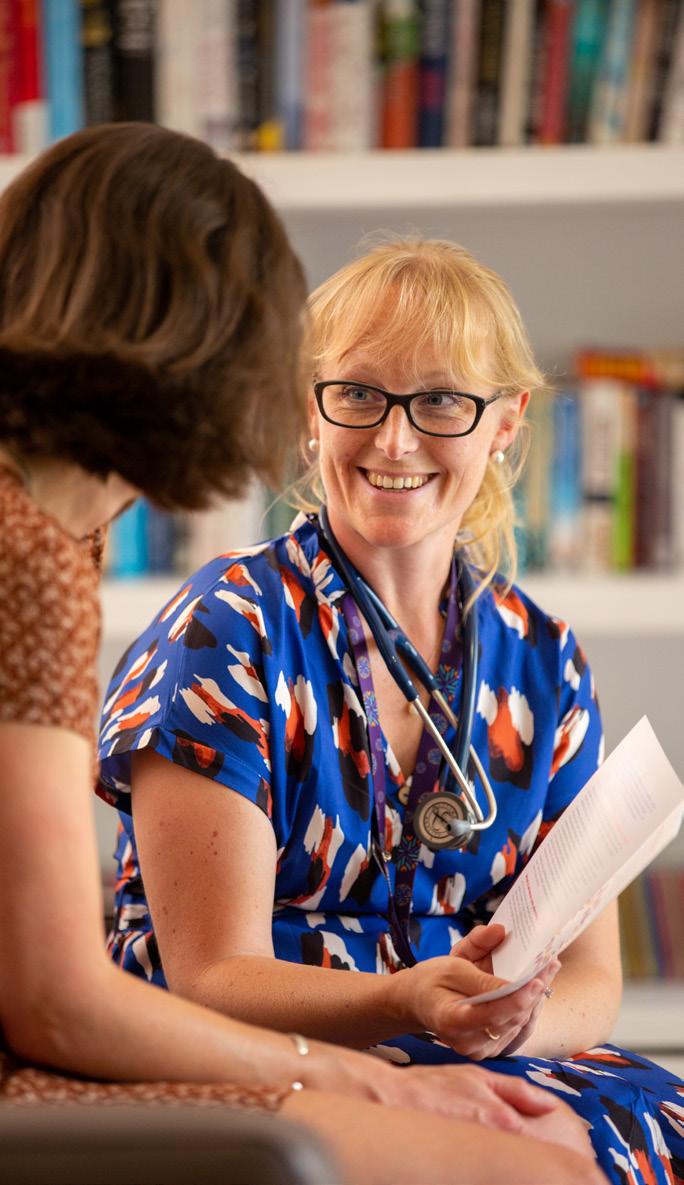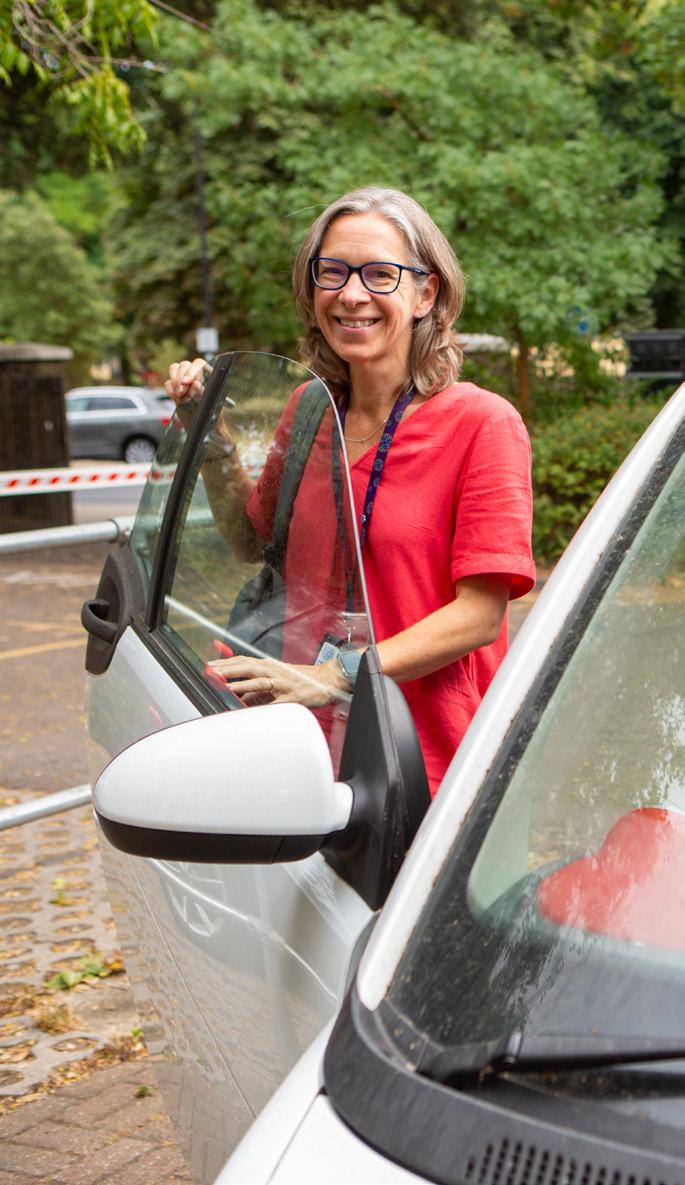
5 minute read
Our strategic review 2021-22
Priority 1
To deliver outstanding specialist palliative care
Advertisement
Priority 2
To reach as many people who need us as we can
Priority 3
To be financially sustainable each year
Strategic objective one: Quality and impact - to deliver outstanding specialist palliative care for our patients, those close to them and the wider community.
Why is this important?
Delivering quality specialist palliative care is at the heart of what we do at Trinity.
In 2021-22 we planned to:
> Begin the transformation of non-bed care, creating a steering group of clinicians with first-hand experience of delivering care;
> Use the analysis of our referral pathway to support the transformation of care;
> Roll out a learning programme of refresher training for clinical staff in the Outcome Assessment and Complexity
Collaborative (OACC) suite of measures.
How did we do?
We set out to transform non-bed care by setting up up DeMoCC (Developing a model of community care). This project aimed to bring together clinicians from across the hospice disciplines. The team redesigned Trinity’s admissions and referrals process and restructured our multi-disciplinary team meetings to improve patient flow and ensure constant focus on patient priorities.
We updated staff training on the use of the OACC suite of measures and these are embedded into the patient assessment and review process. Further work is planned to assess the impact of our care, using the OACC measures as well as other patient reported outcomes.
We began the process of changing our electronic patient record system which will provide a range of improvements to deliver more coordinated, seamless care to our patients. The project will complete in 2022-23.
Strategic objective two: Reach - be accessible to and reach as many people who would benefit from our care as possible
Why is this important?
Demand for hospice services is increasing, particularly in the community. People are living longer. The longer they live the more likely they are to be living with multiple conditions and have more symptoms that will require our specialist intervention.
We estimate that demand for our care will rise by over 40% by 2030. We must find ways to be more efficient and effective without compromising on quality and safety as demand increases.
In 2021-22 we planned to:
> Return to face-toface services within the hospice;
> Innovate and deliver services virtually where appropriate and affordable and explore and source the relevant platforms needed to deliver our community services virtually. This includes services that have been traditionally delivered in an outpatient setting as well as those delivered in person, in people’s homes.
How did we do?
2021-22 2020-21 Indicator
3,844 4,012 Total number of people supported (includes carers or separate patients and family members who received support) 2,440 2,473 Patients supported 25,333 29,516 Phone calls by the community nursing team 1,977 856 Home visits by the community nursing team 284 294 Patients received care on the IPU 263 264 People received bereavement support 1,665 1,662 Bereavement support sessions 2,397 2,381 Received care in their own homes
We continued to develop how we support patients in light of the impact of the pandemic, through reintroducing previous ways of working and embedding new practice. We reintroduced face to face visits for patients at home which is reflected in the higher number of visits made and the lower number of telephone calls.
The number of patients on the inpatient unit was slightly lower than the previous year due to the continued impact of Covid-19 on our nursing workforce.
Since launching Trinity’s five year growth plan in 2022, we have embarked on a programme of clinical transformation. The growth plan is discussed in our plans for 2022-23 on page 9. The Transform Programme has been launched to build on DeMoCC and develop a new patient-centred clinical model of care. We hope that this will help to expand our reach to everyone in the communities we serve who could benefit from our services.
We established a programme team to develop an integrated clinical strategy over a two year programme (2022-2023), as part of the overall transformation of our clinical services. The clinical strategy will be grounded in the Ambitions for Palliative and End of Life Care national framework for local action 2021-2026 and deliver the clinical service goals of Trinity’s five year growth plan.
Strategic objective three: Sustainability - to increase revenues and be financially sustainable each year
Why is this important?
As demand for services increases, costs to deliver those services also increase. Trinity receives 30% of our costs of care from our core NHS contract each year. We must raise the remainder of the income through retail and fundraising.
In 2021-22 we planned to:
> Deliver a cashneutral budget;
> Continue our detailed review of costs and capital expenditure and safeguard liquidity and cashflow to ensure our financial position remains robust;
> Invest in capital projects focusing on digital transformation, notably the implementation of a new patient records system;
> Rebuild our retail operation with fewer shops and lower rent;
> Focus our fundraising efforts on the areas that will be most productive in the short and medium term and scale faceto-face fundraising activity in line with relaxed restrictions;
> Continue to find ways to reduce our costs without reducing the quality and safety of our services.
How did we do?
Once again, the generosity of our supporters and the hard work of our Fundraising and Retail teams has resulted in a financial surplus. After two positive financial years we have added to our reserves, improving our resilience for future years.
We reopened our retail business in April 2021 and achieved the highest profits on record, with higher profits from our twenty shops than were achieved with 32 shops in the last full financial year.
We have started to grow our Fundraising team back up to full strength, after reducing headcount significantly during the pandemic. The financial performance of the fundraising team has exceeded expectations for two years in a row and continues to go from strength to strength. We continue to find ways to reduce our costs without reducing the quality of what we do.
In 22-23 we will also be investing in our people, building and retail operation to fund growth for the future in order to meet the growing demand for Trinity’s services.
In fundraising, we will focus our efforts on the areas that will be most productive in the short and medium term. Longer term, it will be difficult to meet the growing demand without a matching increase in NHS funding.






